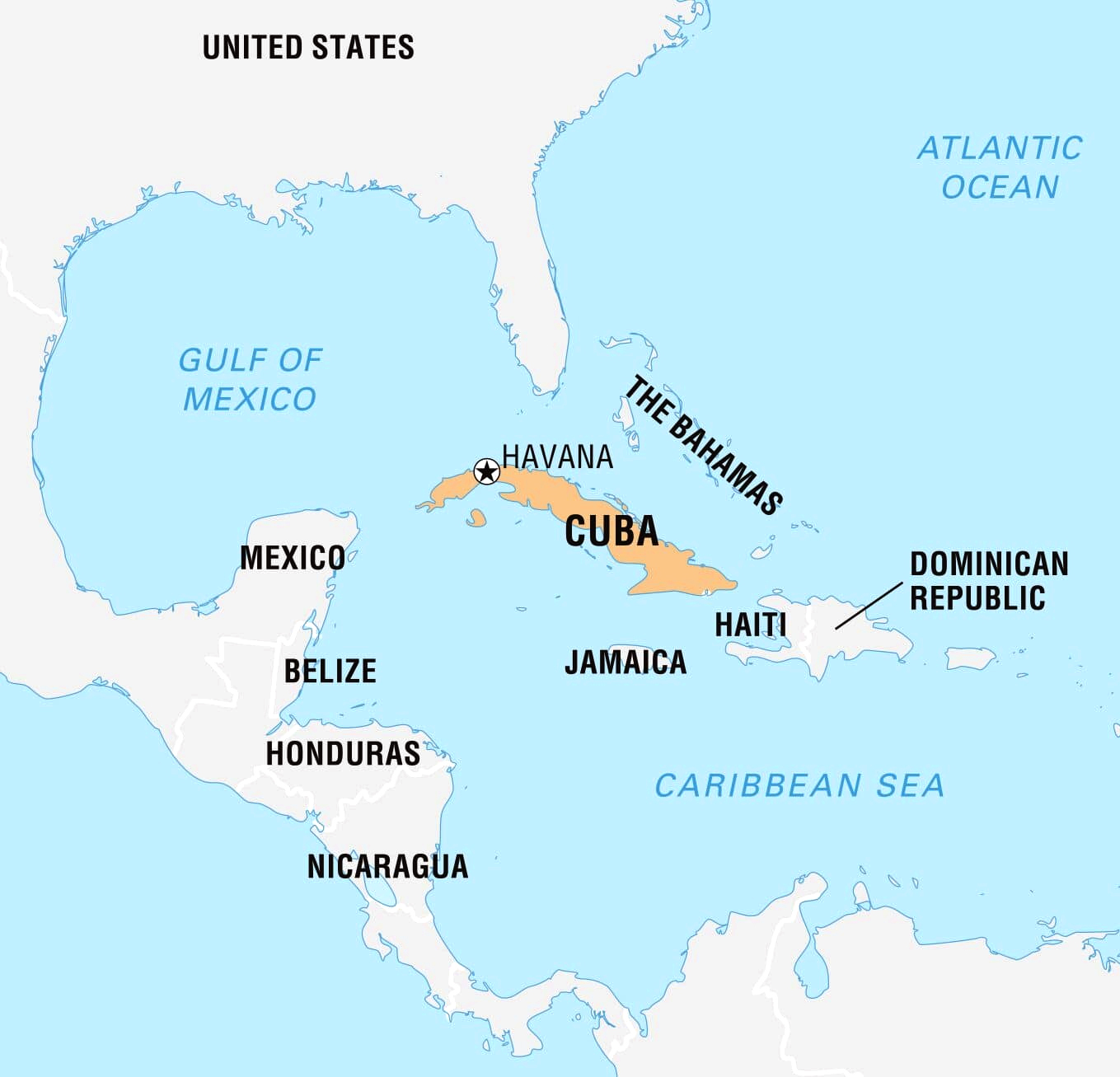International Relations
USA Redesignates Cuba as State Sponsor of Terrorism
- 14 Jan 2021
- 6 min read
Why in News
Recently, the USA State Department has designated Cuba as a State Sponsor of Terrorism for repeatedly providing support for acts of international terrorism in granting safe harbour to terrorists.
Key Points
- Provisions for sanctions on countries:
- The State Department of the USA can place four categories to enlist any country as sanctioned:
- Restrictions on foreign assistance by the USA.
- A ban on defence exports and sales.
- Certain controls over exports of dual use items.
- Sanctions can also be placed on countries and persons that engage in certain trade with designated countries.
- Four countries remain on the list: Syria, Iran, North Korea and Cuba.
- Cuba was delisted in 2015 and has been blacklisted again.
- The State Department of the USA can place four categories to enlist any country as sanctioned:
- Cuba Designated as a State Sponsor of Terrorism: The USA government had been accusing the Castro regime for:
- Illegitimate interference in internal politics Venezuela.
- Oppressing the people of Cuba.
- Supporting international terrorism.
- Subversion of the USA justice.
- USA-Cuba Relationship:
- The United States and Cuba have had a strained relationship for more than sixty years, rooted in Fidel Castro’s overthrow of a USA-backed government in 1959.
- Presidents Barack Obama and Raul Castro took several steps to normalize bilateral relations, including restoring diplomatic ties and expanding travel and trade.
- The Trump administration has reversed aspects of the past agreements by reimposing restrictions on tourism and other commerce.
- Havana Syndrome:
- In late 2016, USA diplomats and other employees stationed in Havana (capital of Cuba) reported feeling ill after hearing strange sounds and experiencing odd physical sensations.
- The symptoms included nausea, severe headaches, fatigue, dizziness, sleep problems, and hearing loss, which have since come to be known as the Havana Syndrome. The USA had accused Cuba of carrying out “attacks”, but Cuba denied any knowledge of the illnesses.
- Historical Reasons for Strained Relationship:
- Cuban Revolution: The tumultuous USA-Cuba relationship has its roots in the Cold War. In 1959, Fidel Castro and a group of revolutionaries seized power in Havana (city capital of Cuba). They overthrew the USA-backed government of Fulgencio Batista.
- Cuban Missile Crisis:
- The United States severed diplomatic ties with Cuba and began pursuing covert operations to overthrow the Fidel Castro regime in 1961.
- The missile crisis arose after Cuba allowed the Soviet Union to secretly install nuclear missiles on the island following an attempt by the USA agencies to topple Cuban Government, known as the Bay of Pigs invasion.
- In the end, Soviet Union head Khrushchev agreed to withdraw the missiles in exchange for a pledge from Kennedy (USA) not to invade Cuba and to remove the USA nuclear missiles from Turkey.
- Trade with Soviet Union: After the Cuban Revolution, the United States recognized Fidel Castro’s government but began imposing economic penalties as the new regime increased its trade with the Soviet Union, nationalized American-owned properties, and hiked taxes on the USA imports.
- Embargo by Kennedy Government (1962): After slashing Cuban sugar imports, the USA instituted a ban on nearly all its exports to Cuba, which President John F. Kennedy expanded into a full economic embargo that included stringent travel restrictions.
- India's Stand:
- Supports Lifting Economic Blockade of Cuba: Recently when the USA opposed Cuba’s membership in UNHRC in 2019, India joined the majority of countries from all continents that raised their voices in the UN General Assembly to demand an end to the unjust and long economic blockade of the United States against Cuba.
- Criticised the USA Embargo: In the UN General Assembly, India stressed that the continued existence of this siege by the USA against Cuba contravenes world opinion, undermines multilateralism and the credibility of the United Nations.
- UN General Assembly’s Stand:
- Since 1992, the UN General Assembly has approved every year a resolution acknowledging the necessity of ending the economic, commercial and financial blockade imposed by the United States of America against Cuba.
Way Forward
- Reinitiating Bilateral Talks: Resuming Washington’s blockade against Cuba appears to be the most unjust, prolonged system of unilateral sanctions applied against any country. There is an urgent need to improve the relationship between the two countries through bilateral talks.
- Respecting the Spirit of Democracy: As a large population of Cuban immigrants and people with Cuban roots reside in the USA, it is for the sake of democracy and spirit of internationalism that the two countries make efforts towards reconciliation.
- For India: India has good ties with both the countries. If the tension between the two - USA and Cuba escalates, it is important for India to rationally balance the relationships.






